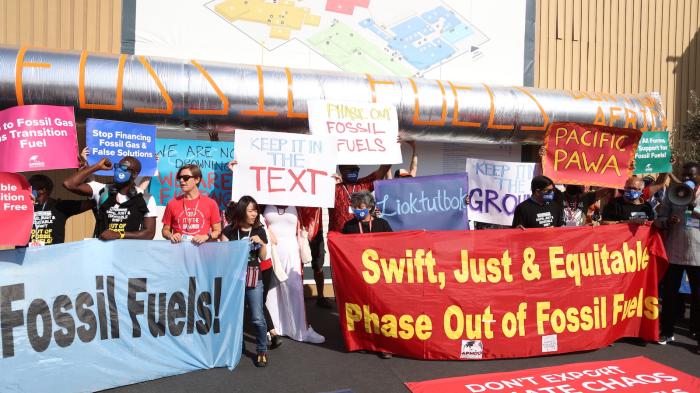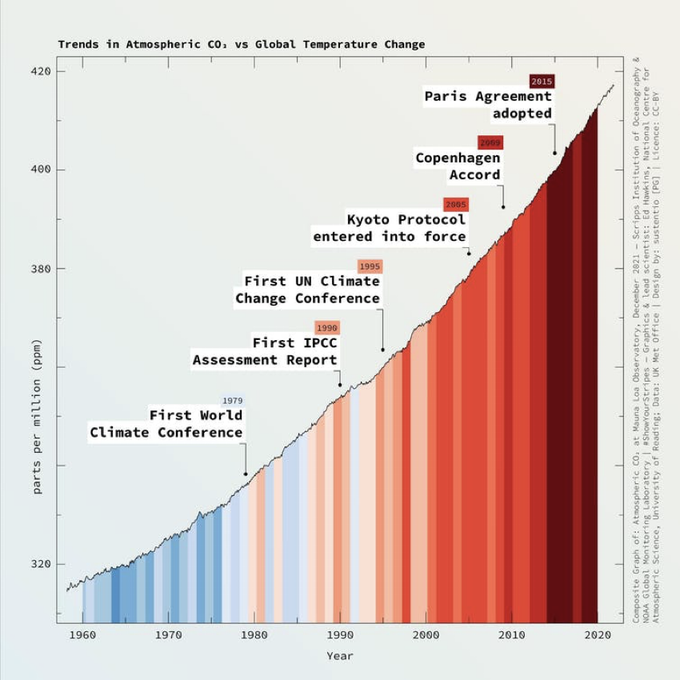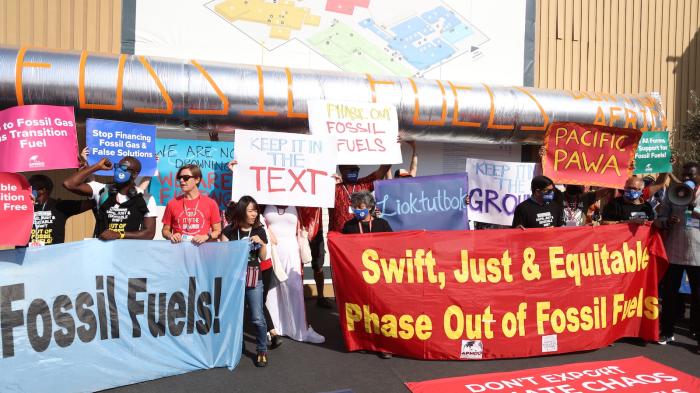by Annette McGee Rasch
Even with experts warning that by 2100 temperatures could climb 2.9°C above the preindustrial average, the recent United Nations COP27 climate conference in Egypt wrapped up without any realistic plan to cap warming at 1.5°C – the goal that humanity might be able to cope with. Once again, negotiations failed to secure vital commitments to phase out fossil fuels – the number one driver of the climate crisis.
Despite overwhelming scientific evidence and escalating impacts, control clearly remains in the hands of the oil and gas industry. Incredibly, fossil fuels have never been mentioned in COP decisions!! As our planet approaches alarming tipping points guaranteed to usher in cataclysmic impacts that only “urgent system-wide transformation” can prevent, the world’s largest corporations are busily plotting new fossil fuels projects, particularly in Africa. Business as usual.
“Some people turned up to negotiate for their futures, but oil and gas lobbyists turned up to negotiate for their wallets,” said David Tong, global industry campaign manager at Oil Change International. “The reality is that the only way to safely limit warming to 1.5°C is to equitably phase out oil, gas, and coal. Instead, we are at risk of a major surge of new oil and gas production.”
Hundreds of Fossil lobbyists were there promoting new language in COP agreements, like “low emissions energy” alongside renewables as the energy sources of the future. Obviously, leaving significant loopholes to justify new fossil fuel development. This slick move goes directly against advise put forth by both the UN’s Intergovernmental Panel on Climate Change and the International Energy Agency.
It’s gotten ridiculous. In the face of ever-larger storms, floods and wildfires, disappearing islands, receding coastlines and melting arctic ice, the 2022 conference was touted as the event where meaningful action would finally take place. Yet here we are, 30 years after 154 countries first came together to sign an agreement to combat climate change, and most nations still have shamefully weak climate policies with ineffective emissions reductions targets.
While unsuccessful, quite a few more countries at least pushed for the final agreement to include the phase out of fossil fuels. Surprisingly, this included the USA, UK, Canada, Australia and Norway, which signals a substantial shift away from many of these nations’ previous positions. Additional individual governments also said they would commit to phasing out fossil fuels by embracing initiatives like the Beyond Oil and Gas Alliance.
Big promises can be made, but too often these nations’ actions speak otherwise. Take Italy, which pledged to stop international financing for fossil fuel projects by the end of 2022 – yet recent analysis indicates they’re involved in projects that could nearly quadruple their annual emissions!
Plus, as governments change hands, policy commitments invariably shift. Consider the USA’s recent midterm elections: with Republicans taking charge of Congress, it’s guaranteed that our positive actions on climate will grind to a halt. They will move to defund and block what Democrats passed. And this is when experts say we’ve got only about nine years of wiggle room left before it’s no longer possible to walk back from myriad spiraling climate impacts.
Perhaps the best outcome of COP 27 was the establishment of the Loss and Damage Fund which is designed to compensate nations most vulnerable to the climate crisis. But there is no official consensus on what specifically constitutes “loss and damage”! What’s the dollar value of grave losses ranging from damaged infrastructure, property and livelihoods to natural ecosystems or cultural assets? How do you put a price tag on a disappearing island your ancestors evolved on? The only home you’ve ever known?
While the new fund offers a ray of hope to those suffering grave losses, it could be many years before there is actual compensation. At least it acknowledges the reality faced by millions of people and sets in motion a process to redress these historical and climate change-related injustices.
“With the creation of a new Loss and Damage Fund, COP27 has sent a warning shot to polluters that they can no longer go scot-free with their climate destruction,” said Harjeet Singh, head of global political strategy at Climate Action Network International.
As with everything that takes place at these conferences – there’s no teeth. Delegates from vulnerable countries and climate justice campaigners want richer nations to contribute to the fund because they are responsible for the lion’s share of historical greenhouse gas emissions. The USA, EU and others seem to be on board after resisting this argument for many years, but how will this work? Who will force the most powerful nations to actually pay? The UN?
Because of this endless gridlock between rich nations, mercenary corporations and citizens, many believe hope for the future rests with grassroots activism, supporting science and researchers, and doing everything possible to promote the growth of renewable energy and 21st century alternative technology. Meaningful solutions won’t come from the top down.
“The voices of those on frontlines of the climate crisis must be heard,” declared UN Secretary General Antonio Guterres, “I share your frustration.” He also said that climate advocates – led by the moral voice of young people – have kept the agenda moving through the darkest of days and they must be protected. “The most vital energy source in the world is people power. That is why it is so important to understand the human rights dimension of climate action.”
And in his closing remarks, UNFCC Executive Secretary Simon Stiell, said: “Without the voices of individuals, whether they are activists, scientists, researchers, youth or indigenous peoples we would not have gotten this far… your voices have a direct impact on the way we find our way forward at the multilateral level.”
But all the speeches, the agreements, the treaties that get broken? The youth say they’re “tired of it,” and millions of people agree with Greta Thunberg, who said, once again, “all we hear from our so-called leaders is blah, blah, blah.”
Zukiswa White, a South African campaigner for gender equity in climate policy said, “There’s no time anymore to keep coming to these COPs as an exercise, when parties come in their private jets and are sponsored by Coca-Cola, etc.”
More than 1,500 activists were arrested in Egypt for exercising free speech before and during COP27, which prompted several hundred brave protesters to chant “free them all” and “no climate justice without human rights” as they marched through the conference’s ‘Blue Zone,’ which is considered to be UN territory and ruled by international law.
Civil society groups and youth activists also held rallies demanding rights for Indigenous groups, women and laborers, especially in developing nations. They called for an end to crackdowns on environmental activists.
Humanity made this mess; we’ve just got to fix it. Thankfully there are organizations like Oil Change International, Beyond Oil and Gas, and Climate Action Network – along with many others – that can show us the way. And give us hope.



